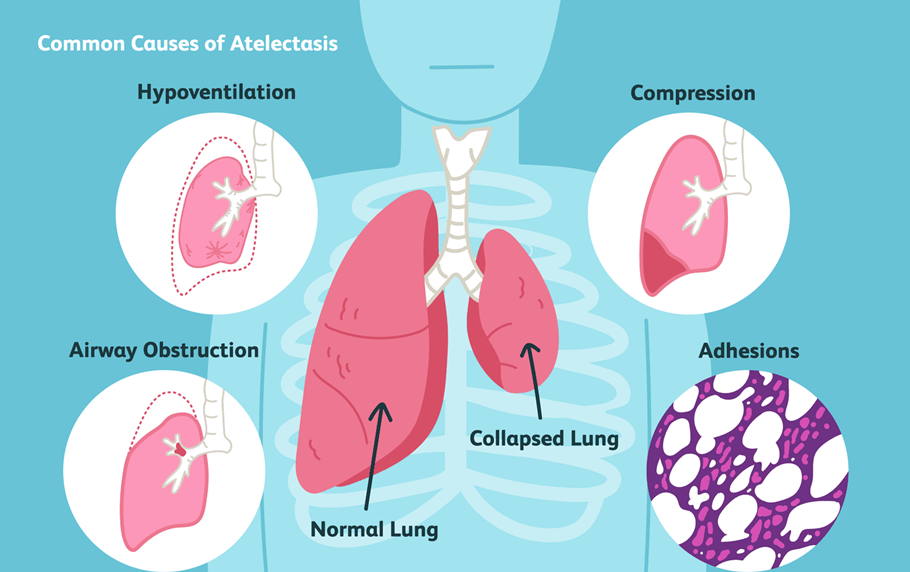A nurse is assessing a client who is 2 days postoperative and is auscultating their bilateral breath sounds. The nurse notes absent breath sounds in the bases. The nurse should suspect which postoperative complication is occurring in this client?
Atelectasis
Pulmonary embolism
Arterial thrombus
Pneumonia
The Correct Answer is A
Choice A Reason:
Atelectasis is a common postoperative complication, especially in patients who have undergone abdominal or thoracic surgery. It occurs when the alveoli in the lungs collapse, leading to reduced or absent breath sounds in the affected areas. This condition can result from shallow breathing, pain, or immobility after surgery. The absence of breath sounds in the bases of the lungs is a key indicator of atelectasis. Preventive measures include encouraging deep breathing exercises, using incentive spirometry, and early mobilization of the patient.

Choice B Reason:
Pulmonary embolism (PE) is a serious condition where a blood clot travels to the lungs, causing a blockage in one of the pulmonary arteries. While PE can present with symptoms such as sudden shortness of breath, chest pain, and rapid heart rate, it is less likely to cause absent breath sounds in the lung bases. Instead, PE may lead to decreased oxygen levels and respiratory distress. Diagnosis typically involves imaging studies such as a CT pulmonary angiography.
Choice C Reason:
Arterial thrombus refers to a blood clot that forms in an artery, which can lead to tissue ischemia and infarction. This condition is more commonly associated with cardiovascular events such as myocardial infarction or stroke. It does not typically present with absent breath sounds in the lungs. Instead, symptoms may include pain, pallor, and loss of function in the affected area. Diagnosis and treatment focus on restoring blood flow to the affected tissues.
Choice D Reason:
Pneumonia is an infection of the lungs that can cause symptoms such as cough, fever, and difficulty breathing. While pneumonia can lead to abnormal breath sounds, such as crackles or wheezes, it is less likely to cause completely absent breath sounds in the lung bases. Pneumonia is usually diagnosed through clinical examination, chest X-rays, and sputum cultures. Treatment involves antibiotics and supportive care to manage symptoms.
Nursing Test Bank
Naxlex Comprehensive Predictor Exams
Related Questions
Correct Answer is A
Explanation
Choice A reason: Positioning the collection device below the level of the chest is crucial to ensure proper drainage of air or fluid from the pleural space. This positioning uses gravity to facilitate drainage and prevent backflow into the pleural cavity, which could lead to complications such as pneumothorax or pleural effusion. The collection device should always be kept below the chest level to maintain effective drainage.
Choice B reason: Clamping the chest tube is generally not recommended unless specifically ordered by a physician or during certain procedures. Clamping can lead to a buildup of air or fluid in the pleural space, increasing the risk of tension pneumothorax. It is essential to keep the chest tube unclamped to allow continuous drainage and prevent complications.
Choice C reason: Applying an occlusive dressing over the chest tube site is necessary to prevent air from entering the pleural space and to secure the tube. However, this is not the primary action related to the positioning of the collection device. The occlusive dressing helps maintain the integrity of the chest tube insertion site and prevents infection.
Choice D reason: Emptying the chest tube collection chamber every shift is not a standard practice. The collection chamber should be monitored and emptied as needed based on the volume of drainage and the specific protocols of the healthcare facility. Regular monitoring is essential, but unnecessary emptying can disrupt the closed system and increase the risk of infection.
Correct Answer is ["A"]
Explanation
Choice A reason: Pee privacy
Ensuring privacy for a patient, especially one who is pregnant, is crucial. Privacy helps maintain the patient’s dignity and comfort during medical procedures. It also fosters a trusting relationship between the patient and the healthcare provider. In this context, “Pee privacy” likely refers to ensuring the patient has privacy when providing a urine sample, which is a common procedure during pregnancy check-ups to monitor for conditions like gestational diabetes or preeclampsia.
Choice B reason: Otoscope
An otoscope is a medical device used to look into the ears. While it is an essential tool in many medical examinations, it is not specifically related to the care of a pregnant patient unless there is a specific concern about ear health. Therefore, this choice is less relevant in the context of routine pregnancy care.
Choice C reason: Tannic acid
Tannic acid is a substance that can be used for various medical purposes, including treating burns and stopping bleeding. However, it is not typically associated with routine pregnancy care. Its inclusion in this list seems out of place unless there is a specific, unusual medical condition being addressed.
Choice D reason: Pupil dilation
Pupil dilation is a procedure often performed during eye examinations to allow a better view of the retina and other structures inside the eye. While important in ophthalmology, it is not a standard procedure in the care of a pregnant patient unless there is a specific concern about the patient’s vision or eye health.
Whether you are a student looking to ace your exams or a practicing nurse seeking to enhance your expertise , our nursing education contents will empower you with the confidence and competence to make a difference in the lives of patients and become a respected leader in the healthcare field.
Visit Naxlex, invest in your future and unlock endless possibilities with our unparalleled nursing education contents today
Report Wrong Answer on the Current Question
Do you disagree with the answer? If yes, what is your expected answer? Explain.
Kindly be descriptive with the issue you are facing.
